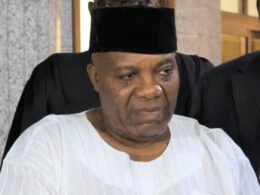Ekiti, Ogun Governors Reject Sharia Courts Amid Protests
The inauguration of the Independent Sharia Arbitration Panel in Ado-Ekiti has sparked widespread controversy in Ekiti and Ogun States, with Yoruba self-determination groups strongly opposing its establishment.
Protests Against Sharia in Ekiti
On Tuesday, members of the Yoruba Regional Alliance (YRA), in collaboration with Yoruba Nation self-determination groups, took to the streets of Ado-Ekiti to protest against the introduction of Sharia law in the region.
- Protesters carried placards with inscriptions such as:
- “No to Sharia in Yorubaland”
- “Sharia will cause war”
- “Sharia is a constitutional blunder”
- “We reject Sharia”
However, security forces prevented the demonstrators from marching through the streets, citing concerns over possible hijacking of the protest.
Speaking on behalf of the group, YRA leader Opeoluwa Akinola described the attempt to introduce Sharia as a plot to create division and cause chaos in Yoruba land.
“The Yoruba people, regardless of religion, have co-existed peacefully for generations without the Sharia penal code. What exactly is the need for it now?”
The Chairman of Yoruba Nation Religious Council (YONAREC), Oluwafemi Edafemi, also rejected the move, insisting that the Islamic legal system is alien to Yoruba governance.
Ogun Governor’s Firm Stand Against Sharia Courts
In a related development, Ogun State Governor Dapo Abiodun has warned against any attempt to establish a Sharia Court in the state.
In a statement, the government clarified that:
- Only courts established under Nigerian law are recognized in Ogun State.
- Sharia law is not part of the state’s legal framework.
- No group or individual has the right to set up a court outside the constitutionally established legal system.
The governor ordered the immediate disbandment of any unauthorized Sharia Court in Ogun and urged residents to report any illegal summons or judicial activities linked to such courts.
“The Ogun State government upholds religious freedom but will not allow unauthorized institutions to operate outside the law,” the statement read.
Legal and Social Implications
The resistance to Sharia courts in Ekiti and Ogun highlights the tensions between religious and secular legal systems in Nigeria. While Islamic law is recognized in some northern states, its introduction in the South-West has been met with strong opposition from Yoruba sociopolitical groups.
This debate raises constitutional concerns over the limits of religious law, as well as potential conflicts in a multi-religious society.
The coming days may see further legal and political battles over the issue, as stakeholders weigh in on the future of legal governance in the regio









